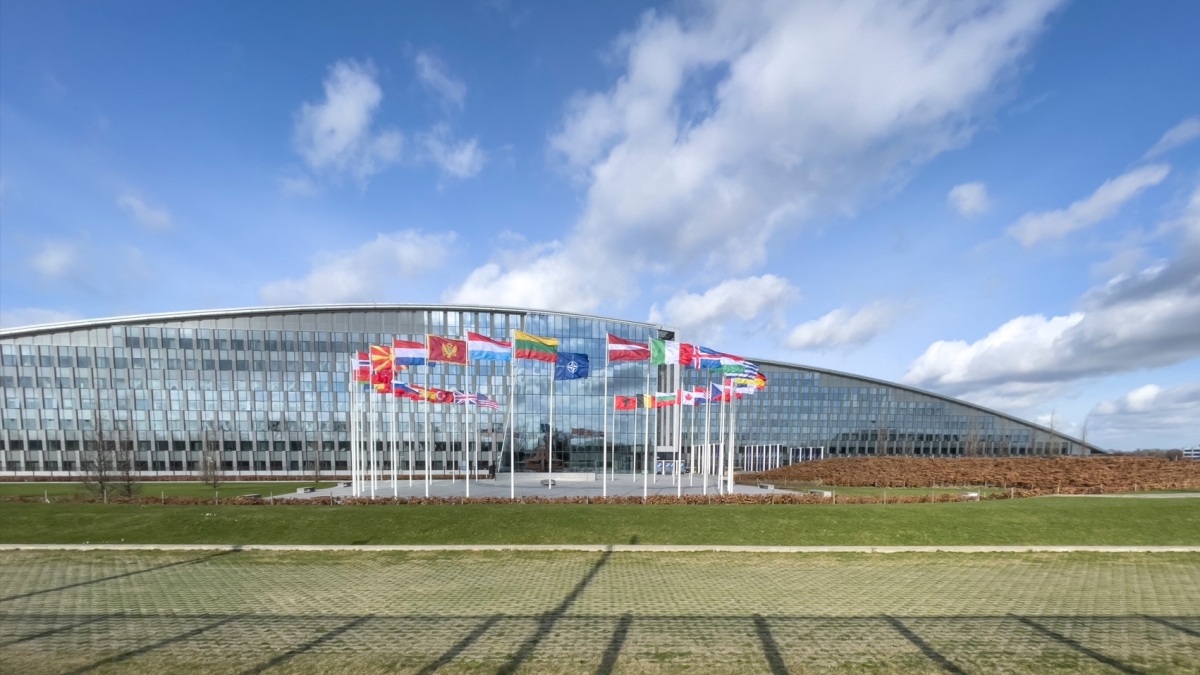McCain Institute panel discusses the future of NATO with a more aggressive Russia

NATO headquarters in Brussels, Belgium. Photo courtesy iStock/Getty Images
President Joe Biden recently ordered the deployment of around 3,000 U.S. troops to Poland, Germany and Romania in a show of support to NATO allies in Eastern Europe.
At the same time, Russia continues to amass its military around Ukraine’s border on all sides, with troop numbers estimated to be around 130,000. With the Ukraine-Russia crisis showing no signs of deescalating, many countries and leaders are wondering what the future of NATO is with a more aggressive Russia.
“It’s fair to say that there are countries who are more enthusiastic about the diplomatic track and perhaps countries who are less enthusiastic. Nobody’s against diplomacy, but the question is: What is the role of diplomacy at this particular juncture?” said Jüri Luik, the permanent representative of Estonia to NATO. “Russians have quite skillfully depicted this situation as part of the major onslaught of NATO-Ukraine being one aspect of that NATO general policy, which obviously is not true at all. It’s a major lie Russians have been peddling for years, but now they have added the strong military component to the information warfare and propaganda. So, the question is how can we mitigate this?”
The approach to containing the mis-, dis- and mal-information campaigns by Russia aimed at weakening confidence in NATO member governments and the alliance itself was the topic of discussion during a recent panel hosted by the McCain Institute and moderated by David Kramer, managing director for global policy at the George W. Bush Institute.
Kramer and Luik, along with Evelyn Farkas, the former U.S. deputy assistant secretary of defense for Russia/Ukraine/Eurasia, and Edward Lucas, nonresident senior fellow at the Center for European Policy Analysis, discussed how Russia and Putin came to be in the position they find themselves in today and what NATO can do to reduce their threats.
So why is Russia undertaking these efforts to destabilize and sow division in NATO?
Many perceive it as Putin trying to preserve Russia’s image as a strong imperial power and the large sphere of influence it once held.
“The first thing to understand is that Vladimir Putin wants to preserve his autocratic, kleptocratic system. In order to do that, he believes that he needs to exercise a sphere of influence over the former Soviet space, and he is very much informed by kind of a Russian imperialist perspective,” Farkas said. “What’s at stake here is the fact that Putin wants to maintain power. … The sphere of influence system predates the second world war and the establishment of the United Nations, the U.N. Charter — the system that has kept us safe from a large-scale global war. What Putin is trying to do is pull us back into that very dangerous situation.”
Lucas explained that NATO came to be in the position it is now by some member countries being willfully unaware of the threat of Russia after the fall of the Soviet Union.
“We are fundamentally arguing with ourselves and not with Russia, and that division in the West is Russia’s biggest asset — and it’s self-inflicted,” Lucas said. “Nobody put Russian tanks on the streets of our countries and said sacrifice your energy security in pursuit of cheap Russian gas, sacrifice your financial security in pursuit of dirty Russian money. … No, we did that to ourselves, because we were naïve and greedy and complacent, and basically stupid.”
Lucas went on to say that in order to stop the Russian threats and deescalate the situation, NATO member countries can do a number of things diplomatically and militarily, such as improving energy security and cyber security. He also noted that reframing how this situation is talked about to a newer, younger, more idealistic generation can help people identify more with the threat that Russia really is.
“We are dealing with a large slice of the population that doesn’t have the worldview, the sort of shaping events, that I grew up with — the Soviet-led invasion of Czechoslovakia, the Polish pope, martial law in Poland, the fall of the Berlin Wall,” Lucas said. “The point which I don’t think we play enough at a government level is to really highlight what kleptocracy and imperialism really mean. The younger generation really dislike imperialism and colonialism — these are big issues for them. … I think we can make a bit more of an effort to say this is happening right now in Russia — Russia is an imperial power that is trying to hang on to influence in its own colonies and its former colonies, and it’s willing to kill quite large numbers of people to do so.”
Panelists discussed other avenues that could be taken to alleviate the Russian threat, such as additional sanctions on Putin and Russia, conducting more NATO military exercises in a show of force, and improving air and cyber defenses and surveillance.
But what is most important to Luik? To maintain trust and unity among NATO members.
“The most important aspect for me is to keep the allied unity,” he said. “Considering the high stakes in play, we have been relatively successful in keeping all allies on the same page, and this was well-reflected by the responses which were given both by the U.S. and NATO to Russia.”
More Law, journalism and politics

Exhibit uses rare memorabilia to illustrate evolution of US presidential campaigns
After one of the most contentious elections in history, a new museum exhibit offers a historical perspective on the centuries-old…

TechTainment conference explores the crossroads of law, technology, entertainment
What protections do writers, actors, producers and others have from AI? Will changing laws around name, image and likeness (…

How to watch an election
Every election night, adrenaline pumps through newsrooms across the country as journalists take the pulse of democracy. We…